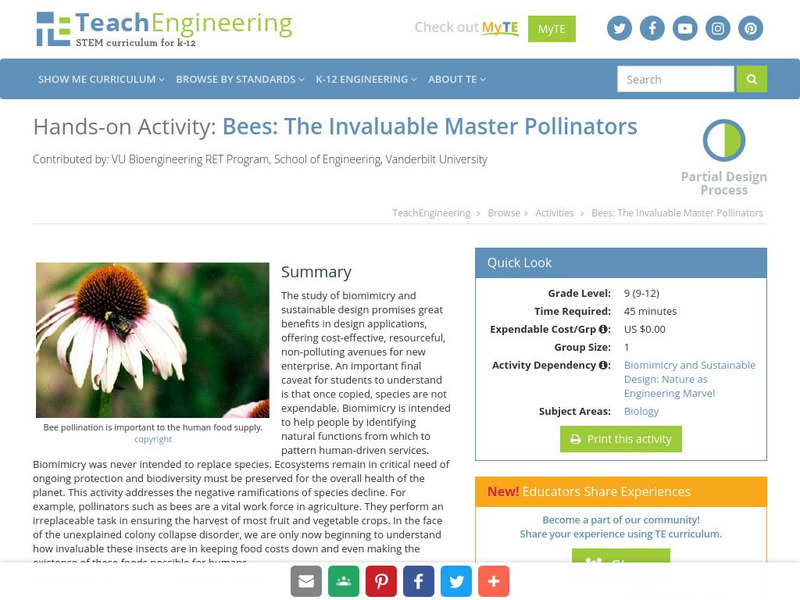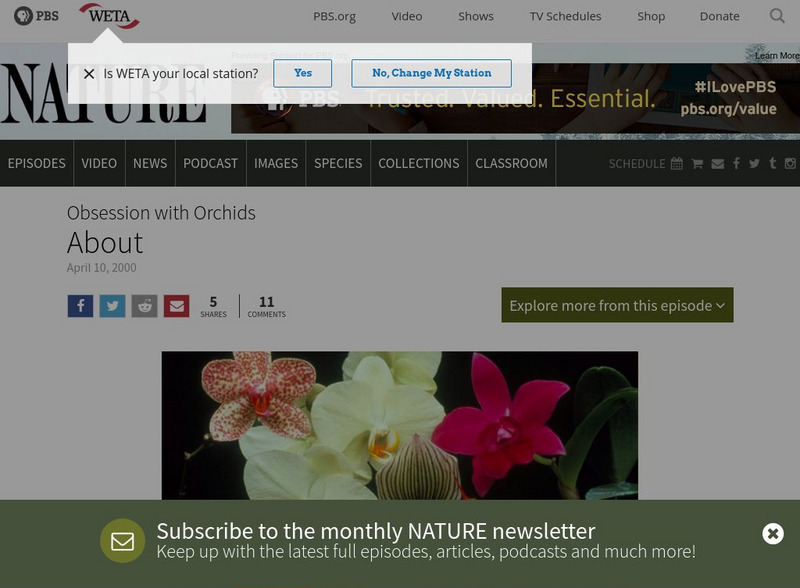eSchool Today
E School Today: Pollination
Learn how plant survival depends on pollination through different means.
Other
What Is Pollination?
This website answers the questions: What is pollination? What is a pollinator? What are the benefits?
Smithsonian Institution
Smithsonian Education: Partners in Pollination
Here is a three-part lesson plan on the plant and animal relationship in respect to pollination.
National Audubon Society
National Audubon Society: Audubon Adventures: The Pollination Story
A colorful, interactive chart illustrating the stages in the pollination of flowers by bees.
NC State University
Beekeeping Insect Note: Cucumber Pollination
How many bees do you need to pollinate cucumbers? How do you maintain the hives? Answers to these questions and more.
Smithsonian Institution
Smithsonian National Zoo: Zoogoer Magazine: Saving Pollinators
This is a lengthy article that examines facts and information related to pollinators and the critical need they fulfill.
Other
Science and Kids Activities: Pollination and Seed Dispersal
Second graders learn how plants depend on animals to disperse their seeds. Students will learn about ways that animals can disperse seeds. They will design their own model and compare it to the real action of plants and animals. In the...
TeachEngineering
Teach Engineering: Bees Are Master Pollinators
The study of biomimicry and sustainable design promises great benefits in design application. It affords means by which to promote cost-effective, resourceful, non-polluting avenues for new enterprise. These "blueprints" have existed...
BiologyWise
Biology Wise: Pollination of Flowers
Discusses what pollination is, the types, what happens during pollination, its importance in agriculture and horticulture, and the biotic and abiotic factors that facilitate pollination. Has some embedded ads.
US Forest Service
Usda: Environmental Benefits of Pollination
In addition to extolling the virtues of flowering plants, this effective site provides several interesting fun facts related to pollination.
US Forest Service
Usda Forest Service: Wind and Water Pollination
This brief site delves into the traits of flowers that are typically pollinated by wind and water.
BiologyWise
Biology Wise: Cross Pollination
Explains what cross-pollination is and its benefits, and provides examples.
BBC
Bbc: Did You Know? Flowers
This BBC "Gardening with Children" section walks through the important process of pollination. Learn exactly what pollination is, along with pollination with and without insects. Finally, learn some unique facts about pollination and...
Encyclopedia of Earth
Encyclopedia of Earth: Botany: Bumblebee
Article on the bumblebee. Covers physical features, life in a colony and as a pollinator, and threats to its survival. Includes links to additional resources. (Published: April 14, 2008)
Science & Plants for Schools
Science & Plants for Schools: Pollination, Fertilization, Fruits [Pdf]
Great PDF to teach students about plant reproduction and life cycle. There are many teacher printables.
TED Talks
Ted: Ted Ed: How Bees Help Plants Have Sex
Fernanda S. Valdovinos explains how intricate pollination networks work and how it can all change from one season to the next. [5:25]
Scientific American
Scientific American: The Buzz on Bees: In Depth Reports
Read this multimedia article about the disappearance of bee colonies worldwide. Find out why it is crucial to saving this important pollinator from extinction.
Cornell Lab of Ornithology
Habitat Network: Habitat Feature: Bare Earth for Native Pollinators
Find out why keeping a part of your yard as bare ground is important for providing nesting habitat for native bees.
National Health Museum
Access Excellence: Coevolution Simulation
This site from Access Excellence provides a lesson plan/lab activity for simulating coevolution. Flowers and straws represent the effect that beak size and shape would have on real pollinators.
PBS
Pbs Learning Media: Pollination
Students are asked to explain the relationship between a bee and a flower.
Other
Clermont College: Coevolution and Pollination
The first part of this page explores coevolution by giving some examples.
Other
Unusual Pollination: Bee Orchid
Some flowers have developed adaptations that lure insects to them for pollination. Visit this website to learn about the very unusual adaptations of the bee orchid.
PBS
Pbs: Nature: Obsession With Orchids
PBS features this program on orchids, including a short video on how an orchid encourages a bee to carry pollen to another flower. There are 3 articles focusing on the flower's ability to coax insects into pollinating other orchids, new...
Nature Conservancy
The Nature Conservancy: Discover the Culprit Behind Declining Bee Populations
Bees provide vital benefits to people, including crop pollination and products such as honey and beeswax. But we're losing bees through colony collapse disorder. In this lesson, students are put at the cutting edge of research on...
Other popular searches
- Bees Pollination
- Flower Parts and Pollination
- Pollination Flow Chart
- Cross Pollination
- 6 Steps of Pollination
- Pollination Activities
- Pollination Flowchart
- Pollination Process
- Pollination and Fertilization
- Plants Pollination
- Cross Pollination
- Plants Cross Pollination
















